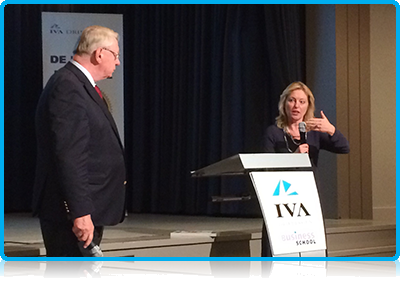Minister of Education Jet Bussemaker in debate with non-funded and private higher education sector.
Minister of Education Jet Bussemaker in debate with non-funded and private higher education sector.
 Minister of Education Jet Bussemaker in debate with non-funded and private higher education sector.
Minister of Education Jet Bussemaker in debate with non-funded and private higher education sector.
On Wednesday, Dutch education Minister, Jet Bussemaker, paid a visit to two private universities of applied science in the Netherlands, TMO - the Fashion Business School on Doorn and IVA, the Automotive Business School in Driebergen. Both institutes offer highly acclaimed and small scale higher education to Dutch students.
At the end of her visit, Bussemaker was invited to join a debate and forum hosted at IVA by the Netherlands Association of Private Higher Education Institutes (NRTO), to which many policy makers and board members from other private higher education institutes were also invited.
The debate was lively and balanced with the private schools asking the minister to consider the areas in which a better level playing field (in relation to funded higher education institutes) could be conceived. Issues were raised such as equal access to specific types of scholarship programmes, such as those for international students, and Wittenborg, represented by its director of education, Peter Birdsall, and chief policy advisor Karen Penninga, argued that international students and Dutch students should have equal access to all sorts and types of additional support, notwithstanding whether they attend a private or a publicly supported University in the Netherlands.
In her answers to the sometimes quite straightforward questions fired at her, Bussemaker showed her extensive knowledge and understanding of the issues surrounding Dutch higher education, and praised the private providers for the initiatives and in some cases best practice scenarios – for instance in forging relationships with publicly funded institutes, such as Wittenborg’s new accreditation cluster for the board bachelor IBA.
However, the minister also made it clear that there were serious difficulties in achieving a level playing field across higher education types in the Netherlands, especially due to the historical development and tradition of the past 25 years in Dutch HE. Indirectly she also referred to the difficult in appeasing all parties, such as the association of public universities of applied sciences, formally known as the HBO Raad.
The NRTO presented a list of 10 points which it requested the minister to sincerely consider implementing in order to create a level playing field in Dutch Higher Education. These included, the introduction of vouchers for part-time Dutch students allowing them to study at any accredited institution they wish, and flexible learning concepts in higher education (i.e a relaxation of the EC Credit / hour norm for adult learners).
Especially important for Wittenborg were the level playing field in student scholarships and the teacher scholarship programme, giving trainee teachers at Wittenborg possible access to Master programme funding. Also, the equivalence of a programme accreditation to institution accreditation for small Universities was requested.
Finally, the NRTO asked the minister to look at changing the whole policy with regard to the status of funded and non-funded universities in the Netherlands and the inequalities in that respect.
A final question was “how does a private University become a funded University – what is the procedure?”. The answer from the senior ministry officials, - the minister couldn’t answer ‘ was that there wasn’t one! An unanswered question was “are there private institutions that actually want to be come funded?”.
WUP 19/11/2014
543 words